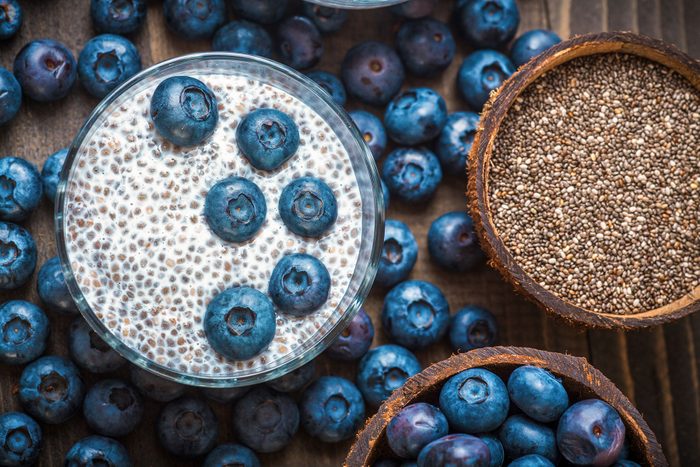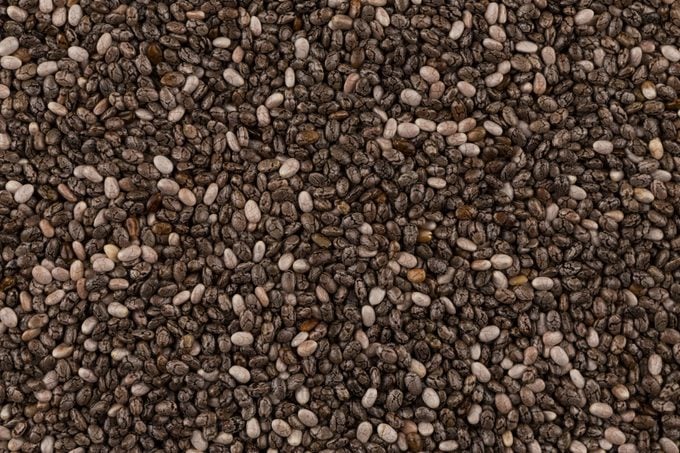New Report: These Top 5 ‘Superfoods’ Are Causing Unexpected Side Effects
Updated: Jul. 25, 2024

These favorites for sprinkling into smoothies and folding into wholesome baked goods are accompanied by chemicals that haven't been widely discussed.
Eating a “superfood” can be a super-great way to get antioxidants or other nutrients that fight disease, but recent research is suggesting that just because a food is “super” doesn’t mean it’s perfect. In fact, some popular superfoods may be causing rather uncomfortable symptoms.
A recent analysis conducted by YorkTest evaluated over 12,000 food sensitivity tests and found a number of common superfoods may cause some sensitivities among consumers.
Unlike a food allergy—which is a serious condition that can result in life-threatening reactions such as anaphylaxis—food sensitivities are caused by a disruption of the digestive system when it can’t break down the food. These types of sensitivities can be a result of genetics, environmental factors, or lifestyle habits.
“Food sensitivities can manifest through a wide number of non-specific symptoms of varying intensity,” says Dr. Elena Salagean, MD, a medical doctor and allergy consultant at Holistic Allergy in the United Kingdom. “They can therefore be more difficult to diagnose. The symptoms can include bloating, nausea, different degrees of tummy pain, diarrhea or loose stools alternating with constipation, acid reflux, headaches, brain fog, itch, and skin rash.”
The Healthy @ Reader’s Digest took a closer look at the report results and dove into the science behind why a person may develop food sensitivities from the following five superfoods.
Chia seeds
Chia seeds have a moderate amount of salicylates, a natural chemical found in some plants—including a few fruits, vegetables, and spices. Dr. Salagean says salicylates may cause gastrointestinal food intolerance symptoms, or in some cases, even asthma and allergy-like symptoms.
Chia seeds also contain lectins, which can be another source of food intolerance. Lectins are a protein found in the carbohydrates of different plant foods, including beans, lentils, soybeans, and peanuts. While research is still limited, experts say lectins have been linked to food intolerances for some based on how these proteins are digested in the gut, specifically for those who already deal with gastrointestinal issues or conditions.
5 Easy Steps to Reset Your Gut Health, Says a Doctor

Goji berries
Similar to chia seeds, goji berries—the red fruit shown in the lower-right of this photo—contain a moderate amount of lectins. Cooking certain foods that have lectins can make them more digestible and help reduce symptoms…however, given that goji berries are already dried, the lectin content of this superfood could cause some discomfort no matter how it’s prepared. Goji berries also contain salicylates—but unlike chia seeds, the salicylates are very high in goji berries.
A 2012 study published in The Journal of Allergy and Clinical Immunology also noted that goji berries can be a potent allergy source bearing “high allergic potential and cross-reactivity” with other consumable plants, such as tomato, tobacco, nuts and Artemisia—a family of aromatic herbs and shrubs. Someone with allergies or intolerances to these plants could experience uncomfortable symptoms when they eat goji berries, although more research needs to be done to confirm this theory.
3 Worst Foods That Cause an Unhealthy Gut, from a Seattle Gastroenterologist
Flaxseed
Although 2010 research suggested a flaxseed allergy is typically uncommon, a 2016 review in the European Journal of Allergy and Clinical Immunology concluded that reactions to seeds such as flaxseed could be a result of contaminated allergens such as mold and pollen. Flaxseed can also be a source of cross-reactivity with other allergy-prone food sources like lupine, peanut, soybean, rapeseed, rape pollen, and wheat.
The Mayo Clinic notes that a person may also experience discomfort if they are consuming too much flaxseed without water to help the body digest it. Flaxseed is high in fiber, and consuming too much fiber without plenty of water can cause bloating, gas, and diarrhea.
Here’s How Much Fiber You Really Need in a Day
Cranberries
Cranberries are another superfood high in salicylates. Specifically, Mount Sinai health system’s blog says cranberries contain salicylic acid, which is also found in aspirin and used as a topical agent to clear up some types of acne.
If an individual has an allergy or an intolerance to salicylic acid, cranberries may also cause uncomfortable symptoms.
Is Cranberry Juice Good for Your Kidneys?
Green tea
Although green tea is known for being a superfood (superdrink?) with a host of benefits, this tea does contain tannins, which is known to cause some reactions for consumers. “[Similar to] red wine, tannins can cause upset stomachs and headaches for some,” says Dr. Salagean.
Tannins can irritate the digestive tract, leading to issues such as diarrhea and stomach aches.
New Research Says This ‘Healthy’ Tea May Actually Cause Liver Damage
A caution about food sensitivity tests
Some allergy professionals are still wary about the accuracy of at-home food sensitivity test results.
Dr. Salagean points out that these food sensitivity tests measure immunoglobulin levels (IgG) levels; high IgG levels indicate that a person is dealing with an infection or an inflammatory response to an autoimmune disease. In these tests, IgG levels are measured to show if a person has a physiologic response in the immune system when exposed to a food. These tests claim that higher levels of IgG can be markers of a food sensitivity.
However, the American Academy of Allergy Asthma & Immunology has stated that these types of tests have not been scientifically demonstrated to accurately report food sensitivities, and that high levels of IgG can be a normal response to these foods.
Still, research suggests these top five superfoods can cause food sensitivities given how the body may react to the chemicals, proteins, or allergens. If you’re experiencing any of the mentioned symptoms while eating these foods—bloating, nausea, stomach pain, diarrhea, acid reflux, headaches, and more—there could very well be a chance your body is sensitive to it.
According to Dr. Salagean, a food diary may be the best way to determine whether any of these foods are actually causing you issues, as well as discussing solutions with a medical professional.
- The FDA Is Clamping Down on at Least 6 Major Cold & Allergy Medicines—Doctors Share 8 Solutions
- 8 Foods You Should Never Eat Before Sex, Say Dietitians
- Here’s How You Can Get Rid of a Double Chin, Say Aesthetic Surgery Experts
- ‘Am I Smart?’ 8 Scientific Cues That Signal Intelligence, from Neuroscientists



















